A Lover's Guide to American Playwrights
Carlyle Brown
It's 5:30 a.m. on Mother's Day Sunday in the Tulsa, Oklahoma airport. Michelle and Jim, a volunteer couple with the William Inge Theater Festival in Independence, Kansas, arrived at the Apple Tree Inn a little before 3 a.m. to pick up me and another Festival guest artist for the ninety-minute drive to Oklahoma, which includes, for the couple, a ninety-minute return. They love their playwrights in Independence.
That love was on display during the weeklong playwriting festival named for the hometown's most famous native son—the wildly successful and deeply troubled "Playwright of the Midwest"—Inge. And it overflowed the night theatre artists from Kansas City, Minneapolis, New York, Atlanta, Los Angeles, and elsewhere joined the dramatist-smitten townspeople to pay tribute the thirty-seventh recipient of its award for Distinguished Achievement in the American Theater. This year's winner was an unlikely one, in a portrait gallery of past winners, including Arthur Miller, Edward Albee, Horton Foote, Neil Simon, and, more recently, August Wilson, Tina Howe, Marsha Norman, and Beth Henley. In addition to being only the third playwright of color to be so honored, the 2018 honoree is also one of the best kept secrets in the American theatre: Carlyle Brown.
As too often happens with playwrights lacking a consistent New York career, especially those whose race, gender, class, or sexual identity makes their concerns invisible or at best illegible to an overwhelmingly white, male, and regressive critical community, Carlyle has, over more than thirty years, inspired artists and excited audiences across the country. He has also built a major body of work that has been majorly overlooked by the culture at large.
[Carlyle Brown] continues to craft plays reminiscent of tall ships—magnificent and practical, built for strong tides and soul-testing voyages, where scenes of daily life are played out in fierce, threatening winds.
A week of performances of Carlyle's plays, followed by an evening of tribute and beautifully performed scenes from several more plays and solo pieces showcased the scale and sweep of his theatricality and the depth of his insight into America. Carlyle lived for twenty years as a sailor and then skipper on nineteenth-century sailing vessels, before pushing himself into playwriting in self-proclaimed ignorance by renting a NY loft, pounding out a first play, and advertising for actors in the trades. He continues to craft plays reminiscent of tall ships—magnificent and practical, built for strong tides and soul-testing voyages, where scenes of daily life are played out in fierce, threatening winds. As an Outward Bound instructor before starting to sail, Carlyle carried Melville's Moby Dick in the woods, and still speaks of Ahab's obsession with the white whale as a model for drama.
I met Carlyle early in my time as artistic director of New Dramatists in New York, probably autumn, 1996. New Dramatists is a laboratory theatre for playwrights that started in 1949 with a small group of member playwrights that included, yes, a young man from Independence, Kansas named William Inge. New Dramatists prides itself on creating a home for writers in what used to be a Lutheran mission church in Hell's Kitchen, and Carlyle took that offer of home literally. Whenever he was in NY from Minneapolis, he lived there, in one of the upstairs residence bedrooms, known as Seventh Heaven. He'd nest in the building for a couple of weeks, two or three times a year. He and his wife Barb even slept in Seventh Heaven for their honeymoon.
I probably first spotted Carlyle in the library of the old church, which doubled as a living room. He was almost certainly barefoot—he usually was—with a cup of the coffee that we kept flowing like a playwright Motel Six. In my mind he was smoking a cigarette. You could still do that inside.
If you'd taken a picture of our first conversation at the notched and battered wooden table around which everything happened in that library/living room, you would have been hard pressed to tell which of us was the host and which the guest. Carlyle's ease was so complete that everyone around him was similarly at ease. By treating that old church as a home, he made it one.
What I saw in that first meeting—as I remember or, maybe, imagine it—and what I've seen hundreds of times since then, was the living example of how to be at home in the world. Carlyle Brown: so completely, so un-defensively himself, thinking his Carlyle thoughts, laughing his Carlyle laugh, talking with equal parts looseness and precision, ever truthful. Carlyle Brown: a man at home in the world.
Maybe this ease grew out of his wanderings. Having sailed the globe and trained young people in the wilds of wherever, having moved from New York to Minneapolis, from theatre to theatre, having shuttled as an historical writer from century to century, ranging far and wide in both imagination and fact, Carlyle has learned to carry his home with him.
He's then trained his unfettered spirit on the very things that make it impossible for African Americans to be at home in this nation. Home implies safety. Home means being wanted. Home carries unconditional acceptance, as that place where, in Robert Frost's famous words, "When you have to go there, they have to take you in." Who could argue that Blacks in America have any such home? As Haitian-born writer Edwidge Danticat has written, when the message from those "meant to protect us [is] that we should either die or go somewhere else. This is the experience of a refugee."
So here we have this playwright—Carlyle Brown—constitutionally brilliant at being home in the world, a writer of rare, inner freedom—writing plays that pit this very ease and footloose freedom against the conditions that make actual economic/political/physical freedom impossible. Where is freedom in bondage, in servitude, in minstrelsy, in the refugee's forced migration, in non-citizenship? Where is freedom when a gun is pointed at your head? Where is agency when you're left out of the dominant story, even when that story was written on your body? In The Fula from America, his one-man picaresque of traveling through Africa, Carlyle sees the horrific cells where slaves were crammed awaiting transit to this continent. "Now no white man or anyone in this world," he asserts, "can preach to me about what it means to be free."
In my own life, playwrights have taught me much of what I know about freedom, what it means to look the world dead in the eye and imagine a better one into being ... No playwright has taught me more about freedom than Carlyle Brown.
Carlyle is steeped in history, in the dramatic human details of untold American history, especially of the nineteenth and early twentieth centuries. From the Buffalo Soldiers to the explorers who "discovered" the North Pole, from pre-Civil War black jockeys to Jim Crow-era minstrels, he bodies forth imagined versions of real people of African descent, people who struggle to find the freedom within themselves even as they negotiate the harness history holds them in.
In The Negro of Peter the Great, the black godson of the Russian Czar works to keep his honor and his own moral compass as society boxes him in. “I have my own laws,” he tells the Czar at gunpoint, teaching the ruler how to live even as he invites his own death. The minstrel Percy in The Little Tommy Parker Celebrated Colored Minstrel Show tastes freedom while being hunted by a mob of angry whites in Hannibal, MO, after cussing one of them out: "For the first time in my life, there was nothin' on my mind. I was free as an animal in the woods."
In Carlyle's breakthrough The African Company Presents Richard the Third, a troupe of free northern blacks—mostly servants—stage the first black public performances of Shakespeare in defiance of just about everybody. When the “woolly-headed” waiter playing Richard asks the African Company’s confrontational producer where his own little bit of freedom is, he’s answered: “You have it. It’s there in your head and here in your heart and in your hands.”
His masterpiece, Pure Confidence, tells the story of Simon Cato, a black jockey in the South during slavery. The jockey is a superstar, the Michael Jordan of jockeys, but he's a superstar in chains, because he doesn't belong to himself. He saves up his small portion of his winnings to buy freedom for his wife and himself, but his owner keeps raising the purchase price. He's on the verge of that bought freedom, when the Confederates fire on Fort Sumter and Civil War breaks out. In his last race, in Saratoga, NY, Simon is crushed under his horse when two white jockeys close ranks against him. He breaks just about everything a body can break.
In Act Two the smart, confident jockey is living in the post-war North. The enslaved superstar has become a "free" bellhop in a Saratoga hotel. Even the hotel clerk lords it over him. The most brilliant moment in this spectacular play is the final moment. Simon has been re-discovered by his former master, who offers him a job back South, overseeing training for his estate of horses. Simon has to choose between a miserable bellhop's life in the North or a good job with the man who once enslaved him. This is where Carlyle is at his most Carlyle-ian: this moment of choice between the rock and the hard place, the devil and the deep blue sea, this moment of choice between two prisons, two sets of chains. This is the moment Carlyle spotlights Simon's agency, his hard-won freedom.
"Well, Caroline," Simon tells his wife, "it seems to me that the only time you're ever really free is when you get a chance to choose. 'Cause once you choose, after that you bound to be a slave to something." Carlyle draws the moment out, extending this breath of the couple's self-possession in a life of degrading indenture. Simon and Caroline plop down on the couch, only now and for an instant at their leisure. Simon continues: "So I say, while we in the midst of choosing, why don't we just rest here in our little bit of freedom for a spell." And as the world breaks into a gallop around them, they sit. And sit. And the play ends.
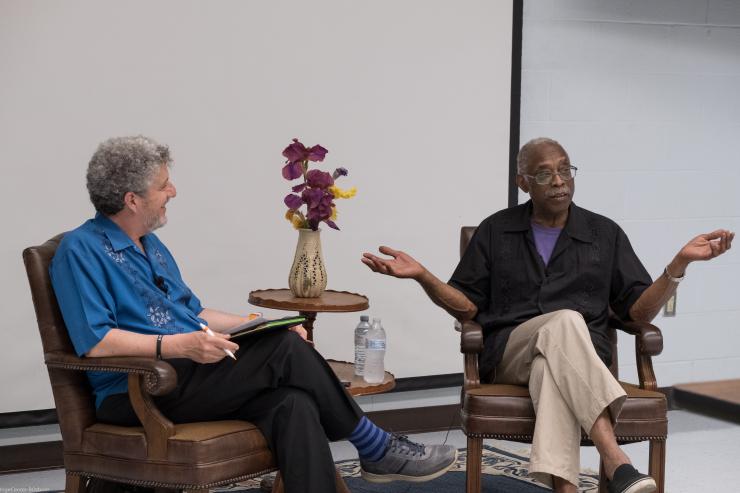
In my own life, playwrights have taught me much of what I know about freedom, what it means to look the world dead in the eye and imagine a better one into being, what it means to speak on voice, no matter how personal or idiosyncratic, what it means to assert your truth, whatever the cost, and walk your path, with or without shoes. No playwright has taught me more about freedom than Carlyle Brown. He gives us the gift of a wide world, and of home in that world.
There's no medal of freedom for playwrights, but there is a community of folks in small-town Kansas who love their playwrights—and who were, over the course of a week's viewing, blown away by Carlyle's body of work. I heard about it Anna Mae's Coffee and Sandwich Shop and from the volunteer shuttle driver. I saw it in the still rapture of the mostly white audience and in the many standing ovations. The woman behind the desk at the Apple Tree Inn greeted me the morning after Kokopelli Theatre (in association with Living Room Theatre) of Kansas City performed his Down in Mississippi, about black and white activists in the "freedom summer" of '64. She said, "I heard the play last night was amazing!" These were the people who came together to celebrate Carlyle Brown's distinction and the full, free achievement of a lifetime. How perfect that it happened in a town called Independence.

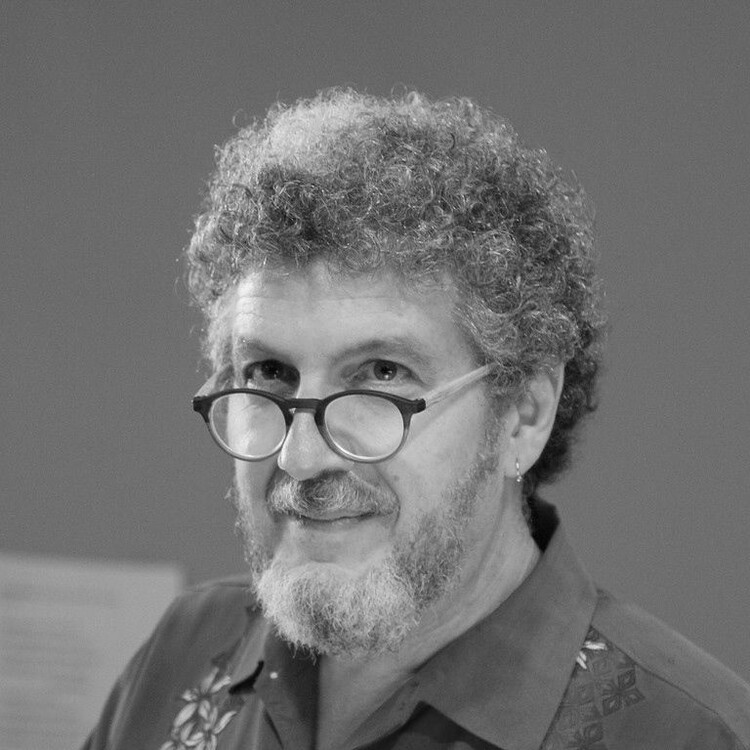
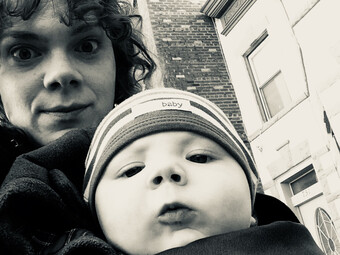

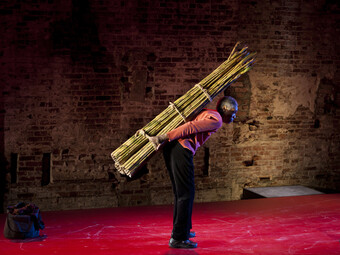


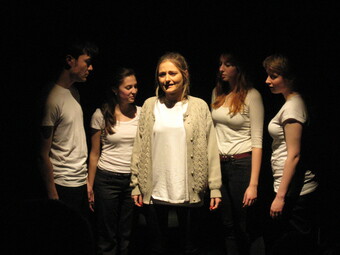

Comments
The article is just the start of the conversation—we want to know what you think about this subject, too! HowlRound is a space for knowledge-sharing, and we welcome spirited, thoughtful, and on-topic dialogue. Find our full comments policy here